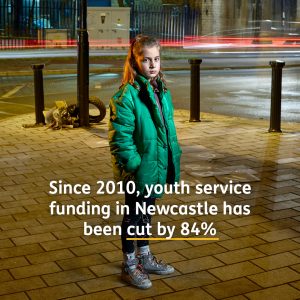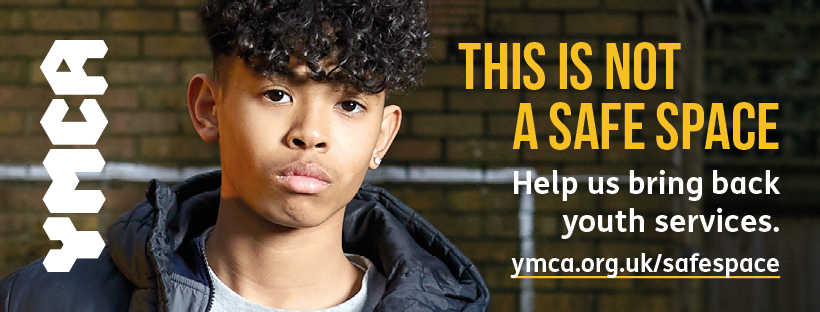Young people believe youth services are vital in battle against crime, gang culture and loneliness, as funding reaches lowest point in a generation
A report released today by YMCA reveals that one in four young people (25%) feel so afraid of gangs they are unable to spend time with friends outside of school. This comes as more than half (55%) feel that a primary purpose of youth services should be to keep young people off the streets, however only 50% of young people were able to identify any youth services near them.
The knock-on effect was that young people (32%) raised concerns that spending time with friends outside of school was limited as they did not feel safe on the streets. They also said that fear of being a victim of crime (22%) and knife crime specifically (17%) stopped them spending time with friends away from school. This comes as almost a fifth (18%) wanted more youth crime interventions locally.
However, youth services are not just about preventing crime. Additional findings revealed that a third of young people (33%) have concerns about their future, with the opportunity to develop new skills (56%) and help improve confidence and self-esteem (55%) listed among the top reasons why youth services are important to them. However the main reason highlighted was the chance to have fun and make friends (57%), something that should be fundamental to the life of every young person.
Almost a third (29%) said they do not have an adult outside of their family who they trust to talk to about their problems, and 29% said they have nowhere to go to socialise outside of school.
Youth services offer a vital lifeline within local communities, providing young people with support, advice and intervention, and yet as funding continues to decline, more and more young people find themselves alone and without anywhere safe to go. Research released by YMCA earlier this year uncovered 70% real terms decline in funding across England and Wales since 2010.

Jeff Hurst, Chief Executive of YMCA Newcastle said:
“While young people are forced to bear the brunt of drastic and increased cuts, they are expected to do so quietly and without consequence.
“These findings show that what they are crying out for are the very things youth services are specifically designed to provide. Every young person deserves a safe space, a trusted adult and the opportunity to enjoy being young.
“Young people are telling us what they need – in their own words – and in order to support them now and in the future, they must be listened to and acted upon.”
Jack and Daniel, both 13, live in an area heavily affected by drugs and crime. They regularly attend a detached youth work project which offers a safe space for them to play games, talk to youth workers and interact with their peers.
When asked why the youth club was important, Jack said: “Because it keeps us from getting into trouble, it gives us better options. If it wasn’t there we would probably be getting up to things we shouldn’t be. We don’t want to get into trouble we just get bored. Here we get to cook and drink hot chocolate and play games”.
Discussing how they feel about cuts to youth services and increasing lack of resources, Daniel added: “It feels horrible, it feels like people don’t care sometimes. I think that more young people around here would get into lots of trouble if YMCA didn’t come down. We need this.”
Each year YMCA supports more than 33,500 young people through our youth work, with almost 8,000 participants involved in crime prevention and avoidance programmes. In Newcastle alone, we supported 3,295 young people last year.
To help make sure the voices of young people are heard, YMCA is asking the public to help make them the central focus of government action. By reinvesting in youth services funding and introducing a national youth services strategy, local authorities would be able to deliver necessary youth services locally to meet the needs of young people in their community.
How You Can Help
YMCA ask the public to show their commitment by signing this petition and raising the issue of youth services with their local MP. Together, we can ensure that these services, which provide a sense of belonging and keep young people safe, do not become a thing of the past.
Download the report here.
Background to YMCA Youth Services Campaign
YMCA Newcastle is the City’s oldest youth charity and has been supporting young people for over 170 years. Last year 3,295 young people accessed our services; with 303 children and young people in the East End taking part in activities to improve their health and wellbeing, 341 young people receiving crisis support such as overcoming abuse, accessing hardship grants or finding accommodation and 70% of young people that attended our employability support services going on to secure a job or further training.
Although YMCA Newcastle is a local, legally and financially independent charity, we are part of the national federation of YMCA’s in England and Wales. Having access to youth organisations across the country allows YMCA England and Wales to conduct research to support each independent YMCA’s work with young people.
Figures uncovered by YMCA reveal the true extent of cuts to youth services funding by local authorities in England and Wales since 2010, with an allocation of just under £429m in 2018/19, compared to £1.4bn in 2010/11 – a real terms decline of 70%.
Discovered as part of a report into local authority expenditure on youth services in 2018/19, these latest figures add to almost a decade of devastating cuts as spending reaches its lowest point in a generation.
The report emphasises England as most severely affected with a further loss of nearly £26m (6%) identified in the past year alone, delivering a damaging blow to already strained resources.
Every region of England has each seen funding for youth services cut by more than 60% since 2010, with some of the most severely affected experiencing average area cuts of as much as 76% in the North East. Further breakdown locally reveals funding deficits of more than 90% in areas such as Gateshead and 84% in Newcastle.









